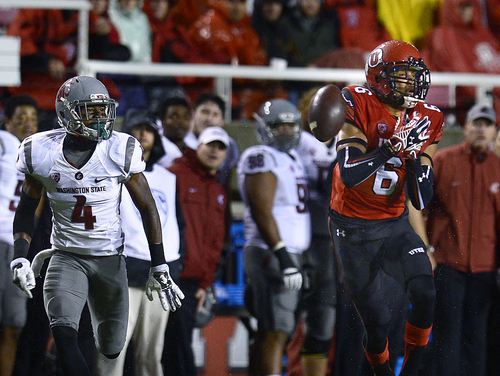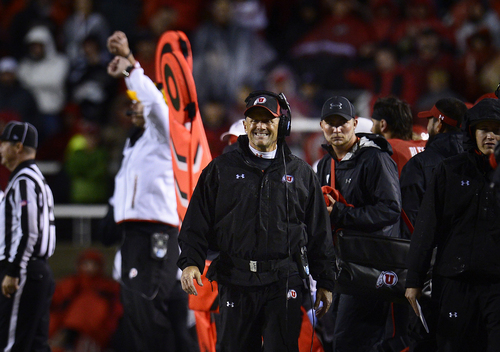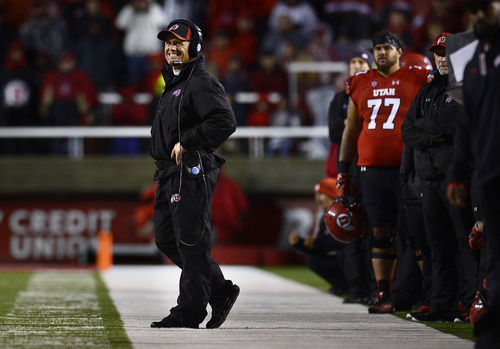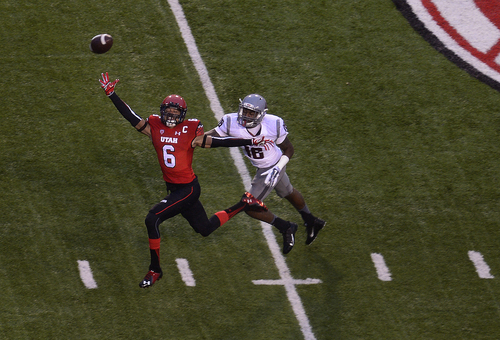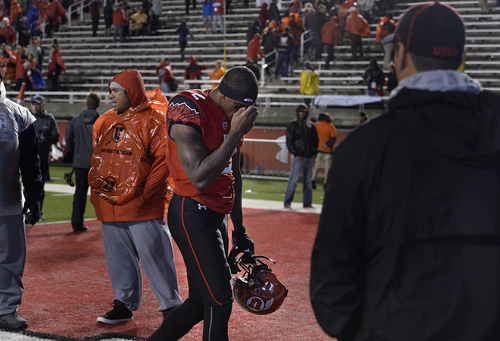This is an archived article that was published on sltrib.com in 2014, and information in the article may be outdated. It is provided only for personal research purposes and may not be reprinted.
It's more than a platitude this week: Utah does not have time to dwell on defeat.
The presumably bleary-eyed Utes reported to the facility at 7 a.m. Monday — a departure from their usual routine of starting filmwork Tuesday — to rewatch Saturday's soul-sucking loss to Washington State.
And then that was that.
Monday afternoon, they would start watching No. 8 UCLA and trying to understand how they can do against one of the Pac-12's best teams what they couldn't against one of — thus far, in 2014 — its worst.
The mood early Monday was "a little bit somber, obviously, like you'd expect," said sophomore defensive end Hunter Dimick. But "our coaches did a very good job of addressing the mood and saying, 'It's on to the next one.'"
The next one scored 62 points against Arizona State in Tempe. The next one returns to Pasadena having proved to be the no-flawed juggernaut media expected when they tabbed it to win the South. The next one is led by potential first-round pick Brett Hundley, who is averaging more than 10 yards per pass attempt and threw, ran and received touchdowns in a 34-27 win over Utah last year.
So this is why dwelling on Washington State is particularly useless: The Utes very likely need to do more next Saturday than they needed to do last Saturday.
Particularly, on offense.
Dave Christensen's bunch failed to sniff the red zone after junior running back Devontae Booker rumbled for 76 of his 178 yards on one play in the first quarter Saturday.
"It's the throwing game," said head coach Kyle Whittingham on Monday. "We've got to be more productive throwing the football. Protection wasn't bad — it wasn't great, but it wasn't bad. But for whatever reason we were just not in sync and not executing in that phase of the game."
The blame, then, falls to the quarterback and his receivers.
Junior Travis Wilson went just 18-for-38 for 165 yards, and senior Dres Anderson was catchless despite multiple opportunities to break the game open.
Whittingham said Monday that, in hindsight, coaches felt backup quarterback Kendal Thompson should have played a couple more series. Asked if Thompson would play more going forward, he said, "We're looking for every and any answer we can come up with offensively."
UCLA's defensive rankings are not as intimidating as you might expect. They're 99th in total defense, allowing 451 yards per game, and 118th in passing defense, allowing 314.
The Bruin defense has conceded more first downs (93) than the offense has earned (89).
And while the offense has turned the ball over just four times, UCLA is prone to mistakes — they average more than eight penalties for more than 75 yards lost per game.
But the Bruins also make plays. Wilson found out as much last year, when he threw six interceptions.
Junior corner Ishmael Adams returned a Mike Bercovici pass 95 yards to break open the game before halftime against Arizona State, and later added a 100-yard kickoff return for good measure.
Sophomore linebacker Myles Jack, touted as a preseason Heisman contender and called "phenomenal" by Whittingham, has not been needed as much in the offensive backfield this season, rushing just 10 times for 23 yards, but he has 29 tackles and three pass breakups. Alongside him is senior ballhawk Eric Kendricks, who boasts 47 stops, an interception, a breakup, a forced fumble and a fumble recovery.
"They're a team that's loaded, top to bottom," Whittingham said. "Virtually every position has got exceptional players."
In sum: If Utah makes mistakes, UCLA's defense has the ability to make them pay.
But UCLA's offense is probably too good for Utah's offense to be conservative.
So they can't play safe.
This Saturday, the Utes must play well.
Twitter: @matthew_piper —
Utah at No. 8 UCLA
P Saturday, 8:30 p.m. MDT
TV • ESPN


